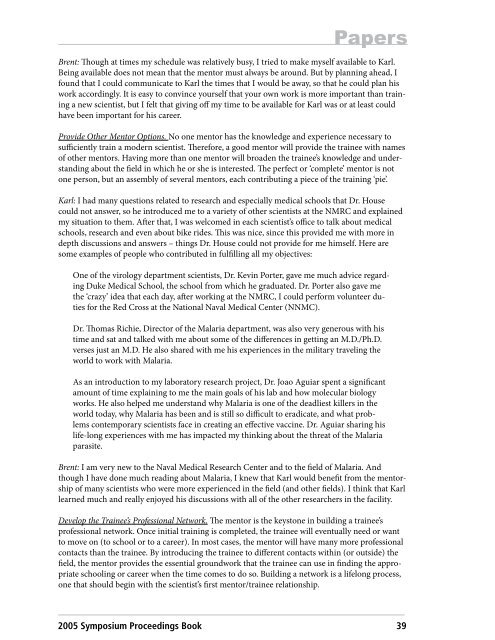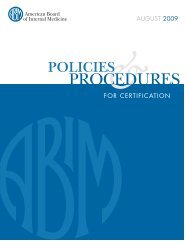The SRA Symposium - College of Medicine
The SRA Symposium - College of Medicine
The SRA Symposium - College of Medicine
You also want an ePaper? Increase the reach of your titles
YUMPU automatically turns print PDFs into web optimized ePapers that Google loves.
Papers<br />
Brent: Though at times my schedule was relatively busy, I tried to make myself available to Karl.<br />
Being available does not mean that the mentor must always be around. But by planning ahead, I<br />
found that I could communicate to Karl the times that I would be away, so that he could plan his<br />
work accordingly. It is easy to convince yourself that your own work is more important than training<br />
a new scientist, but I felt that giving <strong>of</strong>f my time to be available for Karl was or at least could<br />
have been important for his career.<br />
Provide Other Mentor Options. No one mentor has the knowledge and experience necessary to<br />
sufficiently train a modern scientist. <strong>The</strong>refore, a good mentor will provide the trainee with names<br />
<strong>of</strong> other mentors. Having more than one mentor will broaden the trainee’s knowledge and understanding<br />
about the field in which he or she is interested. <strong>The</strong> perfect or ‘complete’ mentor is not<br />
one person, but an assembly <strong>of</strong> several mentors, each contributing a piece <strong>of</strong> the training ‘pie’.<br />
Karl: I had many questions related to research and especially medical schools that Dr. House<br />
could not answer, so he introduced me to a variety <strong>of</strong> other scientists at the NMRC and explained<br />
my situation to them. After that, I was welcomed in each scientist’s <strong>of</strong>fice to talk about medical<br />
schools, research and even about bike rides. This was nice, since this provided me with more in<br />
depth discussions and answers – things Dr. House could not provide for me himself. Here are<br />
some examples <strong>of</strong> people who contributed in fulfilling all my objectives:<br />
One <strong>of</strong> the virology department scientists, Dr. Kevin Porter, gave me much advice regarding<br />
Duke Medical School, the school from which he graduated. Dr. Porter also gave me<br />
the ‘crazy’ idea that each day, after working at the NMRC, I could perform volunteer duties<br />
for the Red Cross at the National Naval Medical Center (NNMC).<br />
Dr. Thomas Richie, Director <strong>of</strong> the Malaria department, was also very generous with his<br />
time and sat and talked with me about some <strong>of</strong> the differences in getting an M.D./Ph.D.<br />
verses just an M.D. He also shared with me his experiences in the military traveling the<br />
world to work with Malaria.<br />
As an introduction to my laboratory research project, Dr. Joao Aguiar spent a significant<br />
amount <strong>of</strong> time explaining to me the main goals <strong>of</strong> his lab and how molecular biology<br />
works. He also helped me understand why Malaria is one <strong>of</strong> the deadliest killers in the<br />
world today, why Malaria has been and is still so difficult to eradicate, and what problems<br />
contemporary scientists face in creating an effective vaccine. Dr. Aguiar sharing his<br />
life-long experiences with me has impacted my thinking about the threat <strong>of</strong> the Malaria<br />
parasite.<br />
Brent: I am very new to the Naval Medical Research Center and to the field <strong>of</strong> Malaria. And<br />
though I have done much reading about Malaria, I knew that Karl would benefit from the mentorship<br />
<strong>of</strong> many scientists who were more experienced in the field (and other fields). I think that Karl<br />
learned much and really enjoyed his discussions with all <strong>of</strong> the other researchers in the facility.<br />
Develop the Trainee’s Pr<strong>of</strong>essional Network. <strong>The</strong> mentor is the keystone in building a trainee’s<br />
pr<strong>of</strong>essional network. Once initial training is completed, the trainee will eventually need or want<br />
to move on (to school or to a career). In most cases, the mentor will have many more pr<strong>of</strong>essional<br />
contacts than the trainee. By introducing the trainee to different contacts within (or outside) the<br />
field, the mentor provides the essential groundwork that the trainee can use in finding the appropriate<br />
schooling or career when the time comes to do so. Building a network is a lifelong process,<br />
one that should begin with the scientist’s first mentor/trainee relationship.<br />
2005 <strong>Symposium</strong> Proceedings Book 39

















